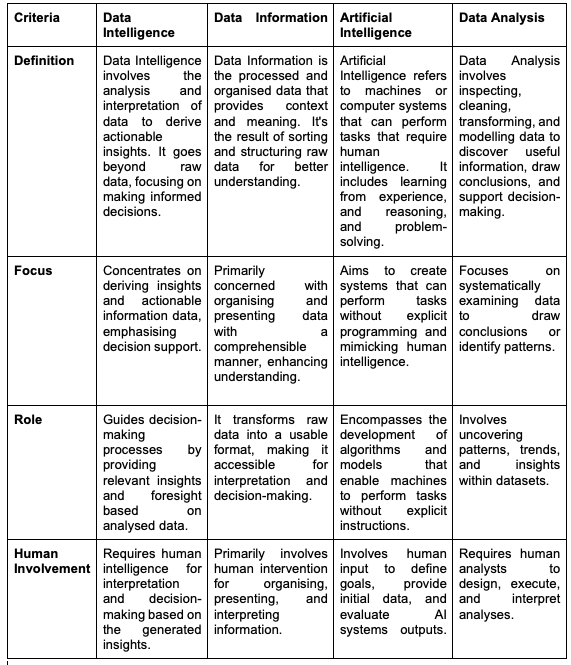Summary: In the realm of Data Intelligence, the blog demystifies its significance, components, and distinctions from Data Information, Artificial Intelligence, and Data Analysis. Use cases illustrate its impact across healthcare, finance, marketing, and manufacturing. Data Intelligence emerges as the indispensable force steering businesses towards informed and strategic decision-making.
Introduction
In the words of Daniel Keys Moran, “You can have data without information, but you cannot have information without data.” This notion underscores the pivotal role of data in today’s dynamic landscape. As industries burgeon with data, unravelling its intelligence becomes paramount.
Keep reading as we uncover the key aspects of Data Intelligence. In this blog, I will answer all the questions that could arise in your mind. First, I will answer the fundamental question ‘What is Data Intelligence?’. So, let’s get started.
What Is Data Intelligence In Data Science?
Data Intelligence is like having a super-smart assistant for big companies. It’s the clever set of tools we use to grasp the information we gather. Imagine this: we collect loads of data, right?
Data Intelligence takes that data, adds a touch of AI and Machine Learning magic, and turns it into insights. These insights? They’re gold. They guide our decisions, making them more intelligent and more effective.
It’s not just about having data; it’s about turning that data into real wisdom for better products and services. In a nutshell, Data Intelligence is the brain behind our business moves.
What Is Data Intelligence With An Example?
So, what is Data Intelligence with an example? For example, an e-commerce company uses Data Intelligence to analyze customer behaviour on their website.
Through advanced analytics and Machine Learning algorithms, they identify patterns such as popular products, peak shopping times, and customer preferences.
With this insight, the company can optimize its website layout, personalize recommendations, and strategically plan promotions during peak times.
By leveraging Data Intelligence, the e-commerce business transforms raw data into actionable insights, ultimately enhancing the overall customer experience and boosting sales.
The Power Of Insight: Why Data Intelligence Matters
In today’s data-driven world, information is no longer a scarce resource. The challenge lies in extracting meaningful insights from the vast oceans of data we collect. This is where data intelligence steps in, acting as a lighthouse guiding us towards informed decisions and strategic advantages.
Data intelligence goes beyond simply gathering data. It’s about understanding what the data tells us, how it can be trusted, and how to leverage it for optimal results. It’s a comprehensive approach that encompasses various aspects. Here’s why data intelligence is crucial for organizations in the 21st century:
Informed Decision-Making
Data intelligence empowers businesses to move beyond intuition and guesswork. Providing data-backed insights allows leaders to make confident decisions across all levels, from product development to marketing campaigns.
Enhanced Customer Understanding
Customer data is a goldmine that reveals preferences, behaviours, and buying patterns. Leveraging data intelligence helps businesses create customer personas, personalize marketing efforts, and ultimately deliver a superior customer experience.
Improved Operational Efficiency
Data can illuminate inefficiencies in workflows and processes. By analyzing operational data, businesses can identify areas for improvement and streamline operations, leading to cost savings and increased productivity.
Competitive Advantage
Data intelligence empowers businesses to stay ahead of the curve. By analyzing market trends and competitor behaviour, they can make informed decisions about product development, pricing strategies, and market positioning.
Risk Mitigation
Data can be a powerful tool for identifying and mitigating potential risks. By analyzing financial data or custom behaviour, businesses can proactively address potential issues before they escalate into major problems.
Innovation And Growth
Data intelligence fosters a culture of data-driven innovation. By uncovering hidden patterns and relationships within data, businesses can discover new opportunities for product development, service offerings, and business expansion.
Key Components Of Data Intelligence
In Data Intelligence, understanding its core components is like deciphering the secret language of information. Let’s dive into the key elements that make up the fascinating world of Data Intelligence.
Data Analysis And Interpretation
In the heart of Data Intelligence lies the art of analysis. It’s not just about collecting data; it’s about turning raw information into meaningful insights. Through statistical methods and advanced algorithms, we unravel patterns, trends, and valuable nuggets that guide decision-making.
Technologies, Tools, And Methodologies
Imagine Data Intelligence as a toolbox filled with gadgets for every analytical need. From powerful analytics software to Machine Learning algorithms, these tools transform data into actionable intelligence. Exploring technologies like data visualization tools and predictive modelling has become our compass in this intricate landscape.
Data Governance And Security
Like a fortress protecting its treasures, data governance and security form the stronghold of practical Data Intelligence. Think of data governance as the rules and regulations governing the kingdom of information. It ensures data quality, integrity, and compliance.
On the other hand, security is a vigilant guard, safeguarding against unauthorized access and potential breaches.
Difference Between Data Intelligence, Data Information, Artificial Intelligence, And Data Analysis
Now, I will answer your questions like ‘What is Data Intelligence and Artificial Intelligence?’ and ‘‘What is the difference between Data Intelligence and Artificial Intelligence?’. Look at the table below.
In essence, while Data Intelligence and Data Information play pivotal roles in decision support and comprehension, Artificial Intelligence represents machine intelligence.
Data Analysis, on the other hand, relies on human-driven processes to extract meaningful insights from data sets. Understanding these distinctions guides us towards effective and informed decision-making as we navigate the evolving data landscape.
Use Cases For Intelligence Data Quality
Data Intelligence is a powerful tool, but like any tool, its effectiveness hinges on the quality of its raw material – data. Intelligence data quality ensures the data used for analysis is accurate, complete, consistent, and trustworthy. Here’s how intelligence data quality fuels successful data-driven initiatives across various use cases:
Enhanced Customer Experience
Imagine a marketing team using customer data to personalize email campaigns. Inaccurate or incomplete data (e.g., wrong email addresses, outdated preferences) can lead to irrelevant messages, frustrating customers and diminishing brand loyalty. Intelligence data quality ensures clean customer data, enabling targeted campaigns that resonate and foster positive customer experiences.
Improved Operational Efficiency
Data quality is vital for optimizing business processes. Imagine a manufacturing company relying on production data to identify bottlenecks. Inaccurate data might lead to misidentified issues, hindering efforts to streamline operations.
With quality data companies can make informed decisions about resource allocation, maintenance schedules, and process improvements, ultimately boosting efficiency and reducing costs.
Risk Management And Fraud Detection
Financial institutions analyze vast amounts of data to detect fraudulent activities. Low-quality data can lead to missed red flags. Intelligence data quality ensures the accuracy of financial data, transaction details, and customer information. This empowers institutions to detect anomalies and suspicious activities more precisely, minimizing financial risks and protecting customers.
Accurate Market Analysis And Competitive Advantage
Marketing and sales teams rely on market data to make informed decisions. Biased or incomplete data can lead to flawed competitor analysis and ineffective marketing strategies. Data quality ensures reliable market research, customer segmentation, and competitor insights.
By leveraging accurate data, businesses can make strategic decisions about product development, pricing strategies, and marketing campaigns, gaining a competitive edge.
Scientific Research And Medical Diagnosis
Scientific research and medical diagnosis heavily depend on data quality. Inconsistencies in medical records or inaccurate research data can lead to unreliable conclusions with potentially harmful consequences. Intelligence data quality ensures the integrity of research data sets, medical records, and clinical trials. This fosters reliable research findings, accurate diagnoses, and improved patient care.
Organizations can unlock the true potential of data-driven insights by prioritising intelligence data quality. Clean, reliable data empowers them to make informed decisions, improve operational efficiency, and achieve strategic goals. It’s the foundation for a data-driven culture that fosters innovation, growth, and success in today’s information age.
A Career In Data Intelligence
The ever-growing importance of data has fueled the rise of a dynamic field – data intelligence. This exciting career path offers a blend of technical skills, analytical prowess, and strategic thinking.
What You’ll Do
Extract valuable insights from data using tools and techniques.
Design and implement data governance strategies.
Communicate data-driven insights to stakeholders.
Collaborate with data analysts, scientists, and business teams.
Who You’ll Be
A problem-solver with a knack for data analysis.
A skilled communicator who can translate data into actionable insights.
A team player with a passion for innovation.
Why It’s Thrilling
Be at the forefront of data-driven decision making.
Work across diverse industries and tackle unique challenges.
High demand and promising career growth potential.
Getting Started
Earn a degree in statistics, computer science, or a related field.
Build your technical skills in data analysis tools (Python, SQL).
Gain experience through internships or entry-level data analyst roles.
Frequently Asked Questions
What Are The Use Cases For Intelligent Data Quality?
Intelligent data quality enhances patient care, accelerates clinical research, optimizes resource allocation in healthcare, improves fraud detection in finance, and enables targeted marketing strategies.
Why Is Data Intelligence Important?
Data Intelligence is crucial for strategic navigation, informed decision-making, adaptability culture, and calculated moves. It transforms data into actionable insights, guiding intelligent decision-making in dynamic business landscapes.
What Is The Difference Between Data Intelligence And Data Analyst?
Data Intelligence guides decision-making with insights derived from Data Analysis. A Data Analyst, however, focuses on collecting, processing, and analyzing data, playing a role in the broader field of Data Intelligence.
What Is The Difference Between Data Information And Data Intelligence?
Data information is processed and organized to provide context. In contrast, data intelligence involves analyzing and interpreting data to derive actionable insights and guide decision-making beyond raw details.
Summing up
As we navigate the data landscape, understanding the power of Data Intelligence is critical. It transforms raw data into actionable insights, guiding intelligent decision-making. In a dynamic world, Data Intelligence emerges as the brain behind strategic moves, ensuring adaptability, improved outcomes, and vitality in decision-making.







